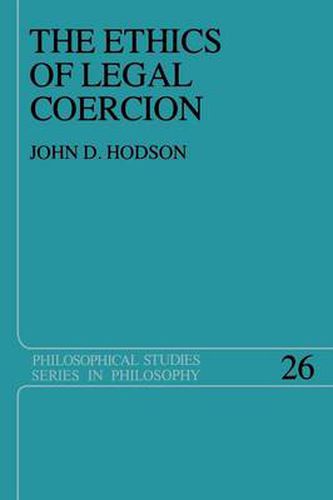Readings Newsletter
Become a Readings Member to make your shopping experience even easier.
Sign in or sign up for free!
You’re not far away from qualifying for FREE standard shipping within Australia
You’ve qualified for FREE standard shipping within Australia
The cart is loading…






This title is printed to order. This book may have been self-published. If so, we cannot guarantee the quality of the content. In the main most books will have gone through the editing process however some may not. We therefore suggest that you be aware of this before ordering this book. If in doubt check either the author or publisher’s details as we are unable to accept any returns unless they are faulty. Please contact us if you have any questions.
Are all of the commonly accepted aims of the use of law justifiable? Which kinds of behavior are justifiably prohibited, which kinds justifiably required? What uses of law are not defensible? How can the legitimacy or the ille gitimacy of various uses of law be explained or accounted for? These are questions the answering of which involves one in many issues of moral principle, for the answers require that one adopt positions - even if only implicitly - on further questions of what kinds of actions or policies are morally or ethically acceptable. The present work, aimed at questions of these kinds, is thus a study in the ethical evaluation of major uses of legal coercion. It is an attempt to provide a framework within which many questions about the proper uses of law may be fruitfully discussed. The framework, if successful, can be used by anyone asking questions about the defensibility of particular or general uses of law, whether from the perspective of someone considering whether to bring about some new legal provision, from the perspective of someone concerned to evaluate an eXisting provision, or from that of someone concerned more abstractly with questions about the appropriate substance of an ideal legal system. In addressing these and associated issues, I shall be exploring the extent to which an ethics based on respect for persons and their autonomy can handle satisfactorily the problems arising here.
$9.00 standard shipping within Australia
FREE standard shipping within Australia for orders over $100.00
Express & International shipping calculated at checkout
This title is printed to order. This book may have been self-published. If so, we cannot guarantee the quality of the content. In the main most books will have gone through the editing process however some may not. We therefore suggest that you be aware of this before ordering this book. If in doubt check either the author or publisher’s details as we are unable to accept any returns unless they are faulty. Please contact us if you have any questions.
Are all of the commonly accepted aims of the use of law justifiable? Which kinds of behavior are justifiably prohibited, which kinds justifiably required? What uses of law are not defensible? How can the legitimacy or the ille gitimacy of various uses of law be explained or accounted for? These are questions the answering of which involves one in many issues of moral principle, for the answers require that one adopt positions - even if only implicitly - on further questions of what kinds of actions or policies are morally or ethically acceptable. The present work, aimed at questions of these kinds, is thus a study in the ethical evaluation of major uses of legal coercion. It is an attempt to provide a framework within which many questions about the proper uses of law may be fruitfully discussed. The framework, if successful, can be used by anyone asking questions about the defensibility of particular or general uses of law, whether from the perspective of someone considering whether to bring about some new legal provision, from the perspective of someone concerned to evaluate an eXisting provision, or from that of someone concerned more abstractly with questions about the appropriate substance of an ideal legal system. In addressing these and associated issues, I shall be exploring the extent to which an ethics based on respect for persons and their autonomy can handle satisfactorily the problems arising here.